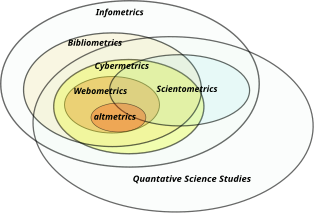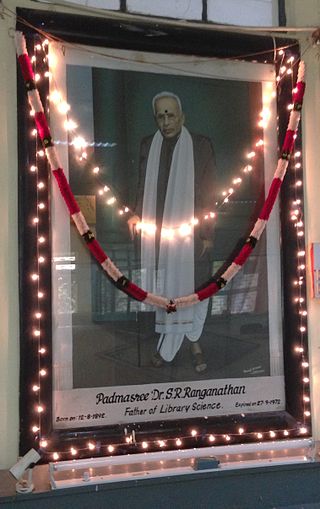Related Research Articles

Bradford's law is a pattern first described by Samuel C. Bradford in 1934 that estimates the exponentially diminishing returns of searching for references in science journals. One formulation is that if journals in a field are sorted by number of articles into three groups, each with about one-third of all articles, then the number of journals in each group will be proportional to 1:n:n2. There are a number of related formulations of the principle.

Information science is an academic field which is primarily concerned with analysis, collection, classification, manipulation, storage, retrieval, movement, dissemination, and protection of information. Practitioners within and outside the field study the application and the usage of knowledge in organizations in addition to the interaction between people, organizations, and any existing information systems with the aim of creating, replacing, improving, or understanding the information systems.

This page is a glossary of library and information science.

Shiyali Ramamrita Ranganathan was a librarian and mathematician from India. His most notable contributions to the field were his five laws of library science and the development of the first major faceted classification system, the colon classification. He is considered to be the father of library science, documentation, and information science in India and is widely known throughout the rest of the world for his fundamental thinking in the field. His birthday is observed every year as National Librarian Day in India.
The Chartered Institute of Library and Information Professionals is a professional body for librarians, information specialists and knowledge managers in the United Kingdom.
A teacher-librarian, also known as a school librarian or school library media specialist (SLMS) is a certified librarian who also has training in teaching.

Indian Statistical Institute (ISI) is a public research university headquartered in Kolkata, West Bengal, India. It was declared an Institute of National Importance by the Government of India under the Indian Statistical Institute Act, 1959. Established in 1931, it functions under the Ministry of Statistics and Programme Implementation of the Government of India.

The following outline is provided as an overview of and topical guide to library and information science:
A documentalist is a professional, trained in documentation science and specializing in assisting researchers in their search for scientific and technical documentation. With the development of bibliographical databases such as MEDLINE, documentalists were professionals who searched such databases on the behalf of users.
E-Science librarianship refers to a role for librarians in e-Science.
Jason Farradane was a British librarian of Polish descent.

Mortimer Taube was an American librarian. He is recognized as one the 100 most important leaders in American Library and Information Science of the 20th century. He was important to the Library Science field because he invented Coordinate Indexing, which uses "uniterms" in the context of cataloging. It is the forerunner to computer based searches. In the early 1950s he started his own company, Documentation, Inc. with Gerald J. Sophar. Previously he worked at such institutions as the Library of Congress, the Department of Defense, and the Atomic Energy Commission. American Libraries calls him "an innovator and inventor, as well as scholar and savvy businessman." Current Biography called him the "Dewey of mid-twentieth Librarianship." Mortimer Taube was a very active man with varying interests such as tennis, philosophy, sailing, music, and collecting paintings.

Documentation science is the study of the recording and retrieval of information. Documentation science gradually developed into the broader field of information science.
A library and information scientist, also known as a library scholar, is a researcher or academic who specializes in the field of library and information science and often participates in scholarly writing about and related to library and information science. A library and information scientist is neither limited to any one subfield of library and information science nor any one particular type of library. These scientists come from all information-related sectors including library and book history.
Brian Campbell Vickery was a British information scientist and classification researcher, and Professor and director at the School of Library, Archive and Information Studies at University College London from 1973 to 1983.
The Classification Research Group (CRG) was a significant contributor to classification research and theory in the field of library and information science in the latter half of the 20th century. It was formed in England in 1952 and was active until 1968. Informal meetings continued until 1990. Among its members were Derek Austin, Eric Coates, Jason Farradane, Robert Fairthorne, Douglas Foskett, Barbara Kyle, Derek Langridge, Jack Mills, Pauline Atherton Cochrane,Phyllis Richmond, Bernard Palmer, Jack Wells, and Brian Campbell Vickery. The group formed important principles on faceted classification and also worked on the theory of integrative levels.
The Department of Information Studies is a department of the UCL Faculty of Arts and Humanities.

Claire Kelly Schultz was an American computer consultant and academic. She was a leading figure in the early development of automated information retrieval systems and information science. A "documentalist", she was particularly known for her work in thesaurus construction and machine-aided indexing, innovating techniques for punch card information retrieval.
The Award of Merit is bestowed by the Association for Information Science and Technology. It is an annual prize to an individual for a lifetime of achievement that recognizes sustained contributions to and/or achievements in the field of information science and/or the professions in which it is practiced. The Award of Merit was first given in 1964 to Hans Peter Luhn.
References
- ↑ Increase Your Wealth and Happiness by Tapping Multiple Sources of Income , retrieved 2023-11-09
- ↑ Smith, Wm. Hovey (June 23, 1985). Real Wealth: How To Obtain and Keep It. PageTurner Press. pp. 14–16.
- ↑ Smith, Wm. Hovey (1985). Guide to the Geology of Bartow County, Georgia (1st ed.). Whitehall Press. pp. 29–38.
- Vickery, B. & Vickery, A. (1987) Information Science in theory and practice (London: Bowker-Saur, pp. 361–369)
- Ellis, David and Merete Haugan. (1997) "Modelling the information seeking patterns of engineers and research scientists in an industrial environment" (Journal of Documentation, Volume 53(4): pp. 384–403)
- Vickery, Brian Campbell (1988) "Essays presented to B. C. Vickery" (Journal of Documentation, Volume 44, pp. 199–283)